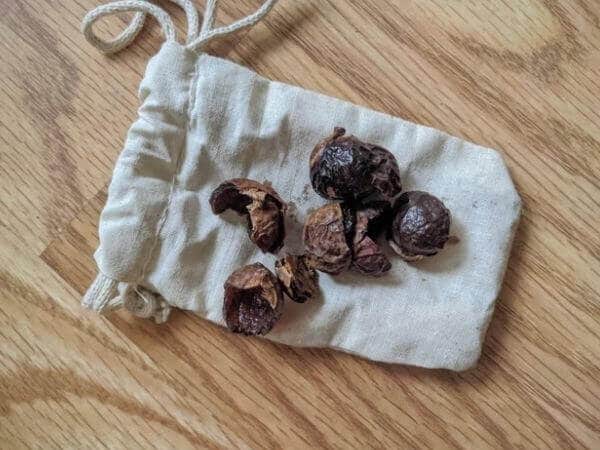Not so long ago, the only natural agents for cleaning I knew were vinegar, baking soda and borax. However, while reading through an online forum feeds, I came across soap nuts. Someone had mentioned about tossing them in the dishwasher.
The comment piqued my curiosity and I read through the entire thread. To cut the long story short, my next stop was in store making my first purchase.
What are Soap Nuts
Soapnut, also known as soapberry is a fruit from the Soapnut Trees (Sapindus mukorossi, Sapindus saponaria and Sapindus trifoliatus). The deciduous trees are indigenous to the Himalayan foothills.
They grows in countries such as India, Pakistan, China and Indonesia. However, the Northern India region features the variety (Sapindus mukorossi) that produces the best quality soap berries.
Although referred to as a nut, soap nut is a berry that features an outer shell/husk and a seed in the inside. The shell is the part that is used for detergent purposes. On the other hand, users store the seed appropriately for replanting.
Growing and Harvesting Soap Nuts
Generally, soap nut trees grow on their own. They do well in tropical climate and in areas with loamy soils. However, they also thrive naturally and through cultivation in grounds with poor quality soils. Furthermore, they are highly resistant to pests and diseases.
Most trees attain a height of up to 20 meters but some can also be as short as 10 meters. In most cases, the tree begins to bear fruits after 9 years. They produce small white flowers which later turn into fruits.
The Advantages of Using Soap Nuts
- Eco-friendly: Soap nuts are free from chemical surfactants. Accordingly, they are friendly to the environment. Unlike a solution of water and regular detergent, laundry water that contains soap nuts can be used for irrigation. It is safe for both edible and non-edible vegetation. Soap nuts are also friendly to the environment by preventing erosion in areas where the trees grow. They do well even in thin infertile soils thereby helping with balancing the ecosystem.
- Hypoallergenic: It is rare for soap nuts to cause allergic reactions. They are safe even for individuals that are allergic to nuts. Therefore, they are extensively used outside laundry for body and hair cleaning.
- Toxins free: Soap nuts are free from toxins that can harm the body and the environment. This makes them a suitable choice for cleaning dishes (dishwasher and in the sink). It is important to clean dishes with toxins-free soaps and detergents because without proper rinsing, harmful chemicals can find their way into the body.
- Fabric safe: Cleaning garments with soap nuts helps maintain their original feel and appearance. They remain soft and bright. The berries do not leave residue that dulls and wears fabrics over time.
- Economic empowerment: Soap nuts are an incredible source of livelihood for the tribal communities that live in the areas where the trees grow. The husks and seeds are separated in preparation for sale and subsistence use after harvesting. Besides facilitating income generation, this helps in the prevention of exposure to chemicals that are present in regular detergents.





